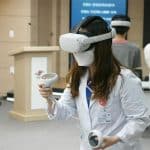August 27, 2020
Creativity has gained an increased focus in education in recent years. Initiatives like Apple’s Everyone Can Create suggests activities that involve drawing, photography, making music etc. But does it make sense to talk about creative activities?

I’d like to share a few reflections. And since I’m a music educator, I’ll connect these to music education in the end. But first, let me draw you something:

Was this an example of creativity?
Some would perhaps say it is, but I’m afraid you cannot possibly know…yet. I’ll get back to this. Let’s start with some common definitions of creativity:
- The ability to use skill and imagination to produce something new or to produce art; the act of doing this (Oxford Advanced Learner’s Dictionary)
- Creativity – the use of imagination or original ideas to create something; inventiveness (Google search for «creativity definition», Oxford Languages)
Most, if not all, formal definitions of creativity include words like «new», «original», «inventiveness» or similar. With my students in primary school, we simplify this as either creating something new, combining known stuff in new ways, or elaborating them in new contexts.
Back to my drawing. I claimed that it is not possible to know yet whether or not this was an example of creativity. It is actually a copy of what a colleague of mine produced back in 1993. Since then, I’ve drawn more or less exactly the same thing hundreds, maybe even thousands of times. It was practically my signature for more than 25 years! From my hand, there’s not even a tiny bit of inventiveness or originality here.
So, is it an example of creativity? No, I was reproducing my friend’s drawing. There’s nothing wrong, of course, about reproducing. On the contrary, it can be both fun and very useful. It can give us skills, increased knowledge, and a deeper understanding. It may even lead to creativity. But reproducing a drawing is in itself not an act of creativity.
RECOMMENDED: https://global-edtech.com/category/community/
Creativity is not about what you do, it’s about a mindset.
To draw, paint, shoot a movie or make music does not necessarily imply any creativity at all. That’s because creativity is not about what you do, it’s about a mindset. This distinction is crucial in education. It asks for teachers to care about the complex context that may hinder or strengthen creativity. This includes feedback and assessment, learning environment, physical environment, classroom routines and more.
A mindset won’t usually follow a time table. Some students may, to some extent, be able to switch mindsets with a specific class/teacher, for instance in art class, music class, or in math for that sake. But what if students are encouraged to use their creative mindsets throughout the day? What if this becomes the way we breathe in education?
How do we teach for developing creative mindsets?
How foolish it would be to prescribe a blueprint for this! But I may promote some key concepts that I find important in my own teaching:
- Encourage exploring. Look for the unseen, listen for the unheard, think about the unthinkable. Creative ideas may come to us in a sudden and unexpected flare of inspiration, but more often they are found through active exploration and investigation.
- Make space for creativity. We need the open space for testing, trying out concepts and thoughts, having the opportunity to change our minds, to fail, to pull it all apart and build it up again. This is where activities may utilize a creative mindset.
- Let students build their voices. When students are able to communicate their creativity, whether it is via words, visual art, music, or any other modes, they will also get a response. This again strengthens their learning, their developing mindset and adds to the basic meaning of creativity.
These are for sure not the only key concepts for developing creativity and maybe not even the most important ones. I’d love to hear your view in the comments.
So, what about music education?
GarageBand for iPad, as well as many other apps, will allow students to work creatively with music. Yet still, when technology is involved in music education, the key concepts mentioned above tend to suffer. This is often due to our impatience and a lack of reflection around the creative mindset.
Let me give you an example: By combining bits and pieces of prerecorded or sampled music (which is what you do when using loops and auto-play in an app like GarageBand), even very young children can make music that sounds almost professional (in relation to sound quality). This may be a great activity! It’s fun, you may reach quick results which is brilliant for boosting confidence. But is it creative? What happens to exploration and «listen for the unheard»? Or students building their own voices vs. using the voices of stars from the past? On the other hand, these tools may also inspire creativity in music as they remove limitations due to a lack of performing skills on the instruments. Any student, at any age, may «play» any instrument in the world. Isn’t that great for exploring music and creativity?
Of course it is, as long as we keep focusing on the key concepts rather than «how to sound like a pro». The backside of loops, auto-play, easy remixing and these kinds of tools, is that students tend to think that everything should sound like that – like the stuff already recorded by others – and it shouldn’t. I don’t know who said this, but it’s one of my favourite quotes: «In ten years from now, we don’t want music to sound like today.»
Conclusion
Creativity is needed for developing practically any part of our society. It’s often said that we need creativity and innovation to move forward. Well, we ain’t going anywhere if we teach our students that creativity is reproducing what we have already done. So, let’s get rid of the impatience. If we want everything to sound great, teach students to reproduce greatness. If we want them to be creative, teach them to create with their own curiosity. It takes practice and it won’t always sound well, but those steps need to be taken!















0 Comments
Trackbacks/Pingbacks